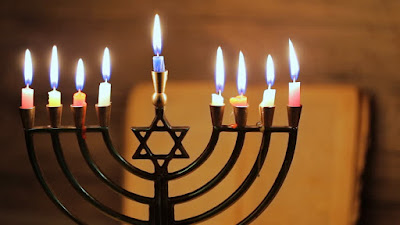Hanukkah LIGHT Prevails even in the Darkness - Advertise the Miracle
And it was at Jerusalem the feast of the dedication, and it was winter. And Jesus walked in the temple in Solomon's porch. Then came the Jews round about him, and said unto him, How long do you make us to doubt? If you are the Christ, tell us plainly.
Jesus answered them, I told you, and ye believed not: the works that I do in my Father's name, they bear witness of me. But you believe not, because you are not of my sheep, as I said unto you. My sheep hear my voice, and I know them, and they follow me: And I give unto them eternal life; and they shall never perish, neither shall any man pluck them out of my hand. My Father, which gave them me, is greater than all; and no man is able to pluck them out of my Father's hand. John 10:22-26
In II Maccabees the celebration is compared to the festival of Sukkoth (the Feast of Booths or Feast of Tabernacles, which the Jews were unable to celebrate because of the invasion of Antiochus. Hanukkah, therefore, emerged as a celebration of the dedication, as the word itself suggests.
What is Chanukah? What the Talmud does say is that the important thing is to “advertise the miracle.” People have to recognize that a miracle took place. It is vital to keep the wonder in Chanukah. That is why the rabbis gave more emphasis to the miracle of the lights than the military victory. Wars come and go. Even the glow of miraculous victory can fade. Young people today do not think that Israel’s War for Independence in 1948 was such a miracle. In 1967, Jews expected a second Holocaust. Now people brush the miraculous Six Day War off as nothing special. History provides numerous examples of outnumbered forces defeating a superpower using guerilla tactics. Was the Maccabean victory so miraculous? That was the question Jews at the time must have asked themselves. However, when the small flask of pure oil that could only last one day lasted eight days it proved that there was a miracle that happened there. The little flask of oil shed light on the big military campaign. “Not by the army, not by power, but through My Spirit, says God” (Zechariah 4:6). Chanukah is about the little light that sheds a great light. excerpt taken from the Miracle of Hanukkah at JewishHistory.org
Thirty-Seven (lamed-zayin) - Inheritance
The number thirty-seven in Hebrew was written with the letters lamed (authority) and zayin (weapon, to cut or pierce). Our inheritance from God comes by means of “cutting a covenant,” as the Bible puts it. When God made His covenant with Abraham in Gen. 15:10, He required Abraham to cut the animals in half (except for the birds). Verse 18 reads, “ On that day the Lord made [karath, “cut”] a covenant with Abram.”
Thirty-seven is the number of inheritance, which is established by God “cutting a covenant” with us. It is often associated with Jesus Christ the ultimate Inheritor of the earth, but it is also applied to inheritance in general.
37 = Warring with authority for your inheritance.
Leave a comment or share this article with a friend.
Various writings from the past
The Road Not Taken




Comments
Post a Comment
Thank you for commenting We appreciate your feedback.